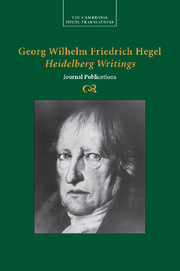Book contents
- Frontmatter
- Contents
- Acknowledgments
- Introduction
- Translators' note
- HEIDELBERG WRITINGS: JOURNAL PUBLICATIONS
- Review, Friedrich Heinrich Jacobi's Works, Volume III
- Review, Proceedings of the Estates Assembly of the Kingdom of Württemberg, 1815–1816 (33 sections)
- Appendix: Excerpts from letters by Hegel, Jacobi, and Jean Paul concerning Hegel's review of Jacobi's works
- Further reading
- Glossary of translated terms
- Index
- References
Review, Friedrich Heinrich Jacobi's Works, Volume III
Published online by Cambridge University Press: 10 December 2009
- Frontmatter
- Contents
- Acknowledgments
- Introduction
- Translators' note
- HEIDELBERG WRITINGS: JOURNAL PUBLICATIONS
- Review, Friedrich Heinrich Jacobi's Works, Volume III
- Review, Proceedings of the Estates Assembly of the Kingdom of Württemberg, 1815–1816 (33 sections)
- Appendix: Excerpts from letters by Hegel, Jacobi, and Jean Paul concerning Hegel's review of Jacobi's works
- Further reading
- Glossary of translated terms
- Index
- References
Summary
Friedrich Heinrich Jacobi's Works, Volume 3, Leipzig: Gerhard Fleischer, 1816. 568pp. + xxvi
The reviewer is pleased that a new volume of Jacobi's collected works has appeared so soon after the last, and wishes both that noble elder and his readers all the best for the uninterrupted continuation of their publication. This third volume contains four writings which, in the words of the preface, “to a certain extent originated simultaneously and are but divergent parts of a single whole that recapitulates itself differently in each of them.” They are: (1) Jacobi's Letter to Fichte, first published in 1799; (2) an essay which first appeared in Reinhold's Contributions (no. 31, 1801), with the title On Critical Philosophy's Attempt to Bring Reason to Understanding and to Transform Philosophy as Such; (3) On a Prophecy by Lichtenberg, first printed in 1801; and (4) the text On Divine Things and their Revelation, with a foreword written for this new edition. An interesting appendix of twenty-three letters to Johann Müller, Georg Forster, Herder, Kant (among them one from Kant to Jacobi), Privy Councillor Schlosser, J. G. Jacobi, and several unnamed recipients concludes the volume.
[SPINOZA]
One might have wished that in the order of publication of these collected works Jacobi's earlier Letters on the Doctrine of Spinoza5 had preceded the treatises contained in the present volume, for these Letters respond to an historical interest that is older and prior to the forms of philosophy dealt with by these treatises, namely the metaphysics of Leibniz and Wolff, which at the time of the Letters was at its last breath.
- Type
- Chapter
- Information
- Georg Wilhelm Friedrich Hegel: Heidelberg WritingsJournal Publications, pp. 3 - 31Publisher: Cambridge University PressPrint publication year: 2009
References
- 1
- Cited by

